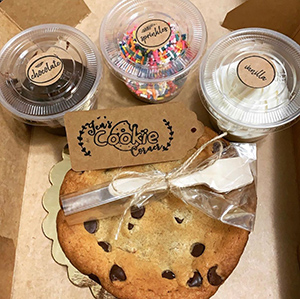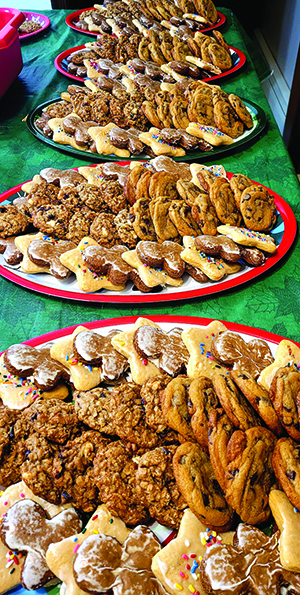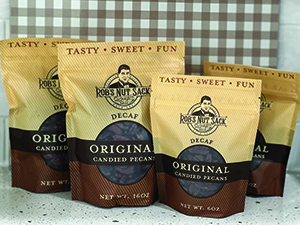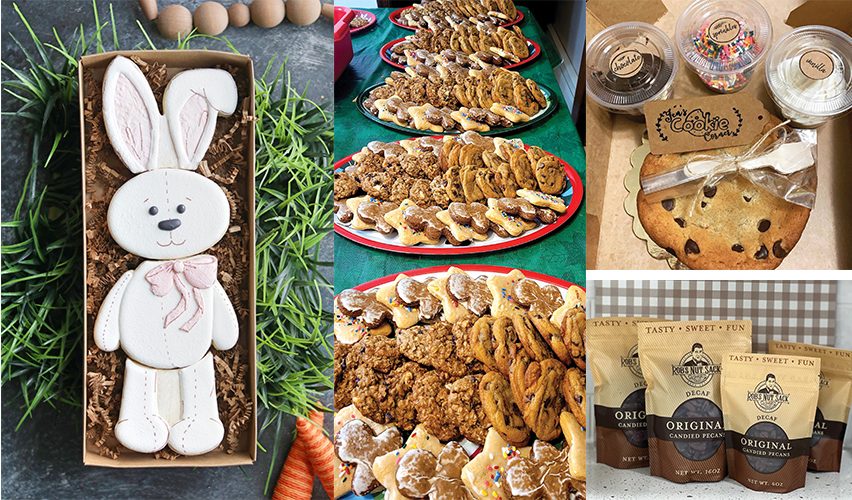The state of New Jersey recently passed a law allowing home bakers and other non-perishable food artisans to safely sell their goods for profit. The decision has been welcomed by many local “cottage foods” producers who wish to use their talents to help support themselves and their families.
Fifty-year-old Jen Henson of Woolwich Township is the manager at Death of the Fox Brewery and Coffeehouse and explained how the death of her mother and the pandemic reconnected her to baking.
“[My mother] passed away from ALS in June of 2019, and baking was truly a form of therapy for me, especially once the pandemic started. I especially enjoyed recreating some of my mom’s favorite recipes as a way to stay connected to her memory. I began Jen’s CookieCornerto not only pay homage to my mom, but to also spread a little joy through baked goods!”

“I’ve always enjoyed baking, and during lockdown when I started a Pampered Chef business, I made jumbo cast iron chocolate chip cookies as a “thank you” to those who hosted an online party. One of my friends suggested that I should sell them. However, when I looked into the regulations for a home baker business, I was surprised to discover that New Jersey was the only state without cottage [food] laws.”
Cottage foods are defined as foods that can be prepared or produced in a private or home-based kitchen and do not need time and temperature control to remain safe for consumption, therefore being low risk for transmitting foodborne illness.
As the pandemic raged, more people like Jen found themselves producing foods in their homes, and renewed interest for a change in the law was kindled. As a result, New Jersey joined other states in allowing cottage food operations on October 4, 2021.
The department reported that input was received from different stakeholders in the initiative, including local health departments, home bakers, the retail food industry, and others.
Many home bakers and others are ecstatic that the state now offers a path to entrepreneurship by allowing businesses to operate while instituting proper safeguards.

Thirty-six-year-old preschool teacher and home baker Katie Owens is awaiting her permit for Farm Daughter Bakes LLC. The Clarksboro resident became emotional when she heard the news that the law has been changed.
“I have prayed for this for over a decade. Not only am I so passionate about what I do, it will make it possible for me to help support my family while still being available for my three children.”

Vanessa Keegan of Gibbstown is Assistant Municipal Clerk and co-owns Jay’s Baker’s Dozen with her Aunts Rose and Sandy Finocchiaro, also of Gibbstown. They acquired their license in November of 2021, just a month after the passage of the law.
The trio were attending a business owner’s meeting when they were presented with an opportunity to participate in a local craft fair. “That’s when we decided to get our license and make the leap,” said Keegan.
“The new law is great because it significantly reduces the start-up costs of a business. We would have had to commit to renting a commercial space before knowing how well our business was going to do,” she added.
Owens agreed. “I would love to one day have my own brick and mortar store, so for now, the Cottage Food Law allows me to pursue my passion on a part-time basis without the added costs of renting a commercial kitchen.”
Rob Malik obtained his permit for Rob’s Nut Sack in November of 2021. The 46-year-old IT specialist is a resident of East Greenwich Township who sells flavored pecans.
“I think the new law is a good thing in that it finally allows New Jersey residents to pursue a sliver of the American entrepreneurial dream with a slightly lower barrier to entry.”

Examples of cottage foods include baked goods such as bread, rolls, biscuits, cakes, cupcakes, pastries, and cookies; chocolates; candies; dried fruit; dried herbs and seasonings; dried pasta; dry baking mix; fruit jams, jellies, and preserves; and most fruit pies.
Other examples include granola, cereal, trail mix, infused/processed honey, nuts and nut butters, popcorn, coffee, tea, vinegar, mustard, and other items upon written application to the Public Health and Food Protection Program.
A cottage food operator must hold a New Jersey Cottage Food Operator Permit to sell any of the above products. To obtain a permit, an operator must become a certified food protection manager in good standing with an accredited program. The state website conveniently points to six New Jersey Accredited Food Protection Manager Organizations. The non-refundable application fee is $100, and if a permit is granted it is valid for two years, after which it must be renewed.
“The application process was very straightforward, and I received my permit within the five-week projected time frame,” reported Henson.
If the cottage food operator’s kitchen uses private well water, a microbiological analysis must be completed. If any deficiency in the application is found, the applicant has 30 days to comply. Once a permit is given, the operator must comply with state, local and municipal operation laws.
The department of health has a right to inspect the private kitchen and/or investigate complaints. Sales are limited within the state of New Jersey and products cannot be sold to retail or wholesale establishments.
Ingredients and any major allergens must appear on the label, as well as other language pertaining to the permit appearing on labels and available at the point-of-sale. The gross annual sales that a cottage food operator generates from the sale of cottage food products cannot exceed $50,000.
“Having the cottage food law allows some startup and running tasks such as mandatory inspections to be waived for the CFO [cottage food operator]. There’s always a chance of having a CFO kitchen inspected but the rules and regulations are slightly different than a full-fledged business since CFOs can only make foods that aren’t subject to time and temperature rules,” Malik opined.
Owens offered additional details about the permitting process.
“It was pretty easy to follow the requirements on the Department of Health’s website. First, I registered for Food Safety Manager classes and took my test to be certified once I knew the material. Then, because I have a well, I had my water tested. After that I was ready to apply.”
“You do have to check with your municipality that there are no issues with you running this type of business from your home. My township (East Greenwich) was very kind and wished me luck. There are other bakers in the NJ Home Bakers Facebook group I am in who have not had the same luck with their township and are being denied.”
“I appreciate that we are required to label our ingredients and major food allergens on all of the baked goods to keep customers safe. The law emphasizes customer safety, and I’m in agreement with that 100 percent,” she added.
While the law has been overwhelmingly applauded by the cottage food industry, there are a few restrictions that producers are hoping the state will reconsider for the future.
“The part of New Jersey I live in is close to Philadelphia. It would be nice to be able to sell to customers there,” said Owens.
Keegan and Henson offered similar sentiments about sales restrictions.
“We… aren’t allowed to ship our product which prevents friends and family who aren’t local from supporting us,” Keegan relayed.
“In the future, I would hope to be able to sell to retail establishments, and to also be able to ship my baked goods to other states, especially to my friends and family in my home state of Massachusetts,” said Henson.
Malik offered another hope, concerning costs.
“This [law] is new in the state so resources and information can be tough to come by. It’d be nice if cottage food operators were able to more easily purchase goods wholesale.”
To help the new cottage foods producers grow and thrive, community members can do a lot more than just purchasing their products.
“The support that I have received via word of mouth has been amazing, and I truly appreciate my customers. I also know that many of my repeat customers also support other cottage food producers in the area,” said Henson.
“Support any additional pro-CFO legislation and shop local such as at farmers markets, festivals, etc.,” added Malik.
“It is extremely helpful if people post reviews on our Facebook page or tag us,” said Keegan. “One of the biggest ways the community can support us is by placing their home baked goods order with a permitted baker. It’s easy to find this information on New Jersey’s health department website,” added Owens.
Permitted cottage food producers in New Jersey can be found here: https://nj.gov/health/ceohs/phfpp/retailfood/cottagefood.shtml
By Colleen Woods-Esposito







